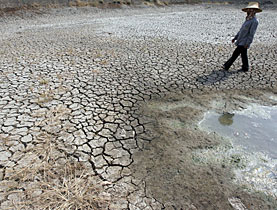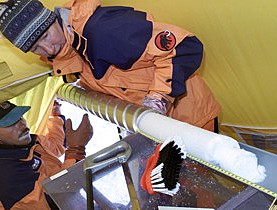Swiss say action on climate change is “crucial”

Switzerland has begun a campaign to persuade those countries with the highest greenhouse gas emissions to commit to future cuts.
A government delegation took the message this week to global talks in the Thai capital, Bangkok, on the future of climate change beyond 2012, when the Kyoto Protocol expires.
About 1,000 government, business, research and environmental representatives attended the United Nations conference.
A climate change expert in Bern, who is backing the Swiss campaign, said the biggest CO2 emitters were “integral” to any long-term action plans for change.
Martin Grosjean, executive director of the Oeschger Centre for Climate Change Research at Bern University, told swissinfo: “It is clear that whole world is sitting in the same boat and we need a fully cooperative approach.”
The Bangkok UN Climate Change Conference drew up an agenda for talks taking place over the next two years to set new greenhouse emission targets to replace those in the existing Kyoto Protocol.
The conference was the first stage in a “roadmap” adopted by governments at a UN gathering in Bali in December. The aim is to come up with a deal in time for the UN Climate Change Conference in Copenhagen in 2009.
On the table for the year ahead are US efforts to cut emissions, assistance for developing nations and deforestation.
“Ambitious”
The head of the Swiss delegation in Bangkok, Thomas Kolly, told swissinfo that the spirit was positive throughout the whole week. “It was a down-to-earth conference and down-to-earth work, but also with some concrete results.
“We said in all our interventions that it was absolutely crucial that we are ambitious, that we have to act. We were in discussions with our Chinese colleagues, with our American colleagues, with India,” he added.
He said the United States – which has not signed the Kyoto Protocol – had shown it was ready and “open to act” in the conference in Bali and had taken steps forward.
“There is no doubt that this will result in a deal in Copenhagen. In itself this is already a big success.
“In international negotiations things always stays open until negotiations end. But I have never seen such dedication, where all the parties are very much willing to conclude at the end of 2009.”
The Bali conference followed the release of the latest scientific report by the UN Intergovernmental Panel on Climate Change, which said climate systems have already begun to change, with evidence in the measured warming of air and ocean temperatures, widespread melting snow and ice, and rising sea levels.
The report, approved by participating governments, said if the world did not act, inactivity could lead to “abrupt and irreversible changes” that would make the planet unrecognisable.
Radical approach
In Bern, Grosjean said plans for post-Kyoto targets had to be ambitious, with evidence pointing to a need for at least a 30 per cent reduction in global emissions by 2025, and bigger reductions in the long term.
“From a scientific point of view it is absolutely clear that really firm and radical steps have to be taken at the global level.”
“The main deficit of the Kyoto Protocol is that until 2012 it includes just a handful of countries. There is no way greenhouse gas emissions can be established at the level needed to prevent dangers in climate change if India, China and few others are not part of the post-Kyoto negotiations,” he warned.
“It is also clear that the problem mankind has produced will keep the atmosphere warm for a couple of hundred more years. It is not a problem that we can solve today or tomorrow. Scientific evidence calls for totally new approaches.”
Despite any deficiencies, Grosjean said the scientific community believed Kyoto was an important solution in the fight against climate change.
“Scientists are always asked if Kyoto is good or bad. But I think we really see every step taken as positive, although we know that it is not enough.
“It is still far better than nothing.”
swissinfo, Jessica Dacey
1992: Rio Earth Summit: adoption of UN Framework Convention on Climate Change.
1997: Adoption of Kyoto Protocol in Japan, the first accord with specific measures to combat climate change.
2005: The Kyoto Protocol becomes a legally binding treaty in February after being ratified by 130 countries. (178 countries have now ratified it.)
2005-6: Kyoto follow-up meetings held in Montreal and Nairobi.
2007: An international meeting is held in Bali, Indonesia, from December 3-14. A process was agreed for a broader climate pact by 2009 to replace or upgrade the Kyoto Protocol, which expires in 2012.
2008: Bangkok talks are held to move forward a “roadmap” adopted in Bali on negotiations on the new deal. Three sessions are planned during the year – in Bonn in June, another in the autumn and the 14th Climate Summit in Poznan in December.
Kyoto, a 178-nation accord, is a 1997 annex to the 1992 UN climate treaty that requires 37 industrial nations to reduce greenhouse gas emissions by an average of five per cent below 1990 levels by 2010.
The Swiss parliament ratified the Kyoto Protocol on climate change in 2003. Switzerland undertook to reduce its CO2 emissions to ten per cent less than 1990 levels by 2010.
Despite ambitious emission targets, greenhouse gas emissions have actually risen by 0.4% in Switzerland since 1990.
A CO2 law came into force in 2000 to ensure that the Kyoto target was achieved. About a thousand enterprises have taken voluntary measures to reduce their emissions.
But it became clear by 2005 that these measures were not sufficient. It is proving difficult, however, to agree on how to strengthen them.

In compliance with the JTI standards
More: SWI swissinfo.ch certified by the Journalism Trust Initiative












You can find an overview of ongoing debates with our journalists here . Please join us!
If you want to start a conversation about a topic raised in this article or want to report factual errors, email us at english@swissinfo.ch.